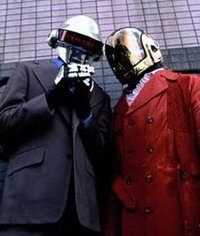Guy-Manuel de Homem Christo (b. 8 February 1974) met Thomas Bangalter (b. 3 January 1975) when they both attended school in Paris, France, in 1987. In 1992, heavily influenced by the Beach Boys, they recorded a song under the name Darling, which in turn found its way onto a compilation single issued on Stereolab's Duophonic label. A review in the UK's Melody Maker described their effort as "a bunch of daft punk", which depressed the pair but unwittingly gave them a name for their next project.
Increasingly influenced by the house sounds filtering across from the UK and the USA, they signed with the Scottish label Soma Records and, in 1994, released the single "New Wave". However, it was their 1995 offering, an insanely catchy slice of techno /funk, "Da Funk", that really set the Daft Punk bandwagon rolling, especially when the Chemical Brothers spotted its floor-filling potential during their DJ sets.
One important factor in the duo's sound is that they are not dance music purists; neither had been to a dance club until 1992 and their music is as influenced as much by Roxy Music and the Ramones as it is by house and techno pioneers such as Laurent Garnier. There is also a strong streak of old-style disco running through their work; Bangalter's father wrote hits for Ottawan and the Gibson Brothers, and "Da Funk" is based around a riff from a vintage R303 bass machine. The re-release of "Da Funk" by Virgin Records, and the subsequent Homework, broke Daft Punk to an overground audience that had for too many years seen French pop as synonymous with crooners such as Johnny Hallyday. Bangalter's alter ego, Stardust, was responsible for "Music Sounds Better With You", one of the club anthems of 1998. After breaking so much new ground with their debut, the pressure was on the duo to repeat the success with their second album.
Discovery proved to be a far more commercial outing, allaying the hard house grooves of the debut with plenty of highly melodic retro synth-pop. Stand-out tracks "One More Time" (featuring Romanthony ), "Digital Love" and "Harder, Better, Faster, Stronger" were immediately hailed as new classics.
Source: http://daftpunknet.free.fr/
